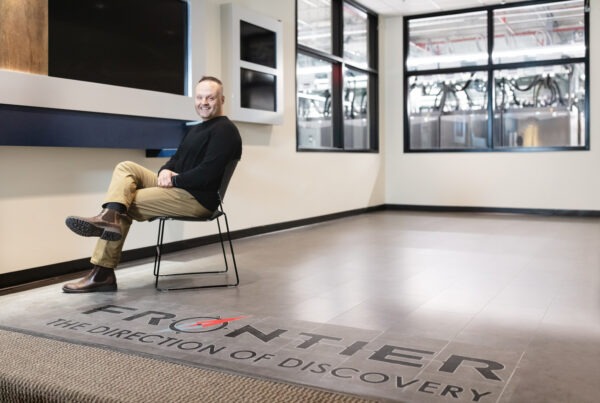by Rachel McDowell
The Oak Ridge Leadership Computing Facility’s (OLCF’s) Matt Sieger has been named the project director for the OLCF-6 effort. This next OLCF undertaking will plan and build a world-class successor to the OLCF’s still-new exascale system, Frontier.
“I am delighted to welcome Matt Sieger as the new project director for OLCF-6,” said Gina Tourassi, director of the National Center for Computational Sciences (NCCS) at the US Department of Energy’s (DOE’s) Oak Ridge National Laboratory (ORNL). “Under Matt’s supervision, the OLCF will build its next leadership-class supercomputer and continue to fulfill DOE’s mission of delivering the most capable systems in the nation for open science to transform scientific discovery and technical innovation. OLCF-6 will usher in a new era and enable DOE’s vision for an integrated research infrastructure to accelerate ‘leadership-scale science.’”
OLCF-6 aims to launch as one of the most powerful systems in the world and provide leadership computing capabilities to researchers in academia, industry, and government. The OLCF, a DOE Office of Science user facility housed at the NCCS, is known for building innovative world-class systems that scientists can leverage to solve increasingly impactful science problems.
“You can think of these supercomputers as powerful scientific instruments, akin to the James Webb Space Telescope,” Sieger said. “These instruments allow scientists to see farther, deeper, and more clearly than they could before.”
As the former deputy director for the OLCF-5 (Frontier) project, Sieger worked with Frontier Project Director Justin Whitt and the Project Management Office (PMO) at ORNL to ensure Frontier’s arrival and deployment. Sieger focused on the internal operations of the project and tracking the performance of the schedule and budget.
In his role as project director for OLCF-6, Sieger will focus more heavily on external relationships with technology vendors, stakeholders from the lab, and the DOE, as well as science users. Ultimately, he will be responsible for the success of OLCF-6.
“This project is exciting because we will be building something even more capable and energy efficient than Frontier, with technologies that will push the edge of what’s possible,” Sieger said. “Fortunately, we have a team at ORNL who is the best in the world at what they do. It’s an incredible honor to be able to add to innovative supercomputing tradition that OLCF has built.”

Matt Sieger, project director for the OLCF’s next supercomputer system, OLCF-6. Image credit: Carlos Jones / ORNL
But Sieger emphasized that OLCF-6 will be a massive team effort. It will include staff members from the Facilities and Operations Directorate, the leased facilities at the UT-Battelle Development Corporation, the PMO office, and across the Computing and Computational Sciences Directorate at ORNL—especially in NCCS. His deputy director for the project is Ashley Barker, section head of operations for the NCCS.
“There are many people involved in a project of this magnitude,” Sieger said. “We will draw staff from across the lab—wherever they may reside—who have something to contribute.”
OLCF-6 is still in its earliest stage. DOE recently granted approval for Critical Decision–0, which is the first step in the process of fulfilling the system and the project’s formal start. The project will now undergo some early vendor engagement and an alternatives analysis to determine the best way for DOE to deliver the system’s capability to scientific users.
UT-Battelle LLC manages Oak Ridge National Laboratory for DOE’s Office of Science, the single largest supporter of basic research in the physical sciences in the United States. DOE’s Office of Science is working to address some of the most pressing challenges of our time. For more information, visit https://energy.gov/science.






